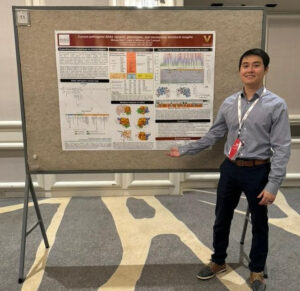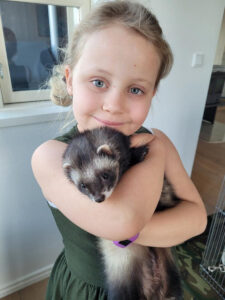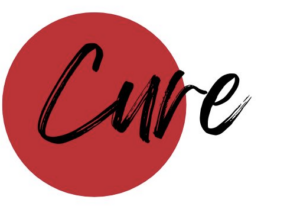DADA2 Progress: Inspiring Stories from Our Community


Dear DADA2 Community:
Spring has arrived in the southern United States, bringing its signature unpredictability—one moment warm and glorious, the next stormy and cold. In many ways, this mirrors the uncertainty in the political landscape, where funding for rare disease research remains in flux. The Foundation is closely monitoring developments and advocating for continued support. While it’s still too early to determine the full impact on current and future grant funding, we remain steadfast in our mission.
For the past nine years, we’ve built an extraordinary DADA2 community—one rooted in resilience, collaboration, and progress. No matter what challenges lie ahead, we are committed to advancing our understanding of the ADA2 enzyme, improving treatment options, and supporting DADA2 patients and their families.
This edition of the newsletter highlights the fruit of our collective efforts in these endeavors. From advocating for better treatment coverage for UK patients to witnessing how a doctoral student’s internship sparked exciting new research, and reconnecting with the first patient diagnosed in Denmark who we met 9 years ago, these stories showcase the power of our collective efforts.
Thank you for being part of this journey. Together, we will continue to push forward, ensuring a brighter future for all those affected by DADA2.

Chip Chambers, M.D.
Founder & President, DADA2 Foundation
 NHS Approves TNF Inhibitors for DADA2 Patients
NHS Approves TNF Inhibitors for DADA2 Patients
The United Kingdom’s National Health Service (NHS) has officially approved the use of TNF inhibitor (TNFi) medications for all DADA2 patients aged five and older. This long-awaited decision brings much-needed relief to patients and families who have faced uncertainty regarding access to and affordability of this critical treatment.
This milestone follows months of dedicated efforts by a coalition of physicians across the UK, alongside the unwavering support of the DADA2 Foundation. A key factor in the NHS’s decision was the Foundation’s groundbreaking Consensus Statement on the Evaluation and Management of DADA2, published in JAMA Open Network in May 2023. This publication provided essential evidence highlighting the importance of ongoing TNFi treatment for DADA2 patients.
This approval marks a significant step forward in ensuring consistent and equitable care for individuals living with DADA2 in the UK.
 Former Intern Advances ADA2 Research
Former Intern Advances ADA2 Research

Former DADA2 Foundation Intern Minsoo Kim recently shared exciting research progress inspired by his internship experience. During his time with the Foundation, he began investigating how mutations in the ADA2 gene affect protein structure and function, presenting his findings in a poster at the 2023 International Conference on DADA2.
Reflecting on his journey, he shared:
With a background in basic research on Cystic Fibrosis and my experience as an intern at the DADA2 Foundation, I developed a deep interest in how ADA2 gene mutations impact protein structure, function, and disease pathology. Motivated by this, I brought the project back to my Ph.D. lab at Vanderbilt University under Dr. Lars Plate. Alongside my colleague Lea Barny, we applied our existing research pipeline to investigate ADA2.
Our work revealed that mutations disrupt ADA2 protein processing, but we also found evidence that dysfunctional ADA2 protein could potentially be corrected by modulating cellular machinery. This discovery paves the way for identifying small-molecule ‘corrector’ drugs as possible therapies for DADA2. We are now preparing to screen FDA-approved drugs for repurposing, offering a potentially faster route to viable treatments. What began as an internship has evolved into a mission to uncover new insights into the disease mechanism and explore novel therapeutic approaches. Through this work, I hope to make a tangible difference for patients with DADA2.
Dr. Kim recently completed his Ph.D. in chemical and physical biology and is now a postdoctoral fellow in Dr. Plate’s lab. The Foundation has also facilitated connections between Dr. Plate, Dr. Kim, and other DADA2 researchers to encourage collaboration and accelerate this promising research.
A Journey with DADA2:
The Morell Thomsen Family’s Story

In 2017, the DADA2 Foundation met the Morell Thomsen family when their daughter, Ida, became the first patient diagnosed with DADA2 in Denmark. At the time, her doctors were unfamiliar with the condition, but thanks to the Foundation’s support, the family connected with the NIH, where Ida—then a toddler—underwent a full evaluation. They later shared their journey in a heartfelt video, offering hope and awareness to others facing the same diagnosis.
Now, nine years later, we checked in with the Morell Thomsen family to see how they are doing and what they’ve learned about raising a family while navigating life with DADA2. Below is an excerpt from our conversation. Click on the button below to read the entire interview.
Tell us about Ida: what does she like to do—favorite school subject, sports, hobbies?
Ida is a happy and curious girl who really likes going to school and learning new things. She does swimming and gymnastics in her free time and often hangs out with friends on the weekends. She’s full of ideas and always quick to get something fun started.
How is she managing with her symptoms and with taking medications?
Ida receives both anti-TNF treatment (adalimumab) and subcutaneous immunoglobulin (for her immune deficiency). Currently, her symptoms are well-managed, though fatigue continues to be the most persistent symptom. To help with this, she has a designated rest/stay-at-home day each week. This allows her to keep up with the rest of her peers during the remaining days — a solution that works well for her, and we will continue it for as long as she needs.
She is generally very cooperative with her medication. She often helps prepare the syringes herself and chooses the injection site. It helps a lot to have a set routine — we always give her a heads-up the day before, so she knows what’s coming. — this helps her prepare mentally and has significantly reduced the number of times she gets upset about it.
She often says the injections hurt, but if we cool her skin with something like an ice cube beforehand, she feels it helps a lot. If she’s feeling unwell or especially tired, injections can be harder on her. In those moments, we talk openly about how frustrating it is and how we all wish DADA2 didn’t exist — but since we can’t change that, we acknowledge the feeling and carry on.
What are the biggest challenges for your family in living with DADA2?
Practically speaking, it requires an enormous amount of planning. We must coordinate Ida’s rest days, medication days, hospital appointments for regular bloodwork and doctor consultations, and make sure to order medication and supplies on time. Both parents work full-time, and Ida has two older siblings who also live with chronic conditions, which demands a great deal from the whole family.
Emotionally, it can feel very isolating. No one truly understands what we’re going through. People are curious and ask questions, and we’re happy to share what we know — but no one can say, “I know exactly how you feel.”
Still, the greatest challenge is the fear of what the future holds for Ida. It’s frightening not to know what lies ahead or whether she’ll continue to do as well as she is now. That’s why we are incredibly grateful for the work of the DADA2 Foundation and support it in every way we can. We’ve witnessed tremendous progress in knowledge and treatment options since her diagnosis in 2017, and we remain hopeful that a cure will be found.
What would be your advice to a family with young children newly diagnosed?
One of the most important things we’ve learned is that you have to become the expert yourself. You can’t count on every doctor or nurse you meet to know about DADA2, so staying informed and persistent is key to making sure you or your child gets the right care. It can be overwhelming, if so, reach out to the DADA2 Foundation. Ask your questions, share your concerns — talking to someone who truly understands makes a huge difference. And when things get tough, with injections and hospital visits, try to remember: this is lifesaving, absolutely essential for your child — and most importantly, it works.
 Featured Published Articles on DADA2
Featured Published Articles on DADA2
Sequential central retinal artery occlusion in two brothers: a fight to prevent blindness
David Oliver-Gutierrez et al, Documenta Ophthalmologica, 11 February, 2025
Kathryn Abe-Ridgway et al, Opthmalic Genetics, 12 Nov 2024
Mimics and Challenging Presentations of DADA2
Admir Öztürk et al, Clinical and Experimental Immunology, 21 March, 2025
TAKE ACTION WITH A DONATION
Every dollar you donate help us find more physicians who can diagnose DADA2, ending the diagnostic journey of a patient and starting their journey to health!

